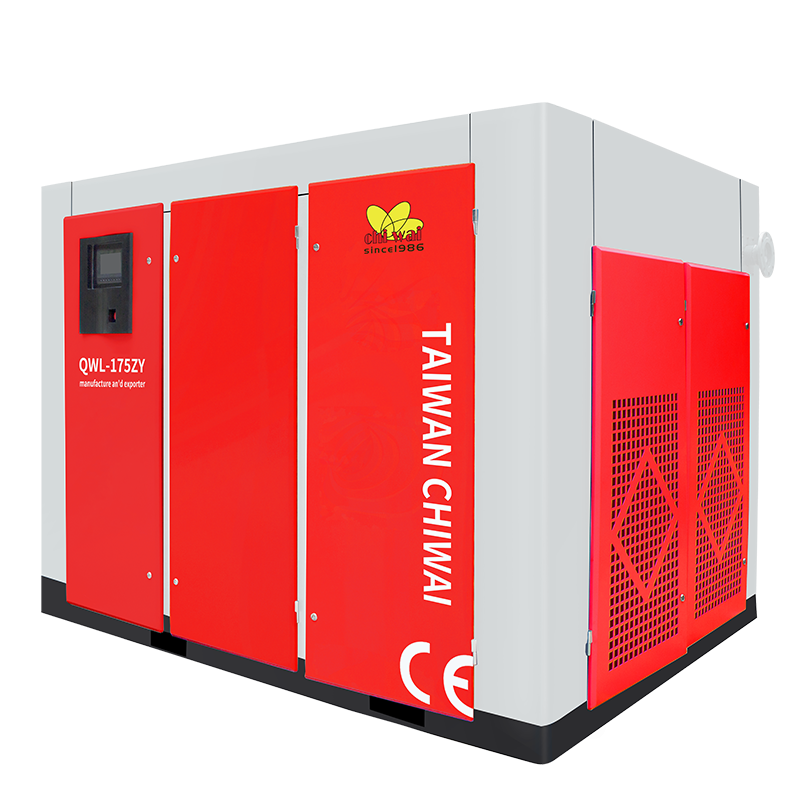
In recent years, variable frequency air compressors have played an important role in the air compressor market due to their good energy saving properties. Even so, many users still don't know the difference between a variable frequency air compressor and a power frequency air compressor. In fact, the main differences between variable frequency air compressors and industrial frequency air compressors are as follows: 1. Stable air pressure.The variable frequency air compressor takes advantage of the stepless speed regulation feature of the frequency converter. It can start smoothly through the controller or the PID regulator inside the frequency converter. It can quickly adjust the response to situations where the air consumption fluctuates greatly. 2. No impact at startup.The frequency converter itself has the function of a soft starter. The maximum starting current is within 1.2 times of the rated current, while power frequency starting is generally more than 6 times of the rated current. Compared with variable frequency, the starting impact is very small. This impact not only on the power grid, but also on the entire mechanical system will be greatly reduced. 3. Variable flow control.The frequency converter of the variable frequency air compressor adjusts the motor speed in real time according to the actual air consumption to control the exhaust volume. Therefore, the variable frequency air compressor can work in a relatively wide range of exhaust volume. 4. AC power supply has good voltage adaptability Due to the over-modulation technology used in the frequency converter, when the AC power supply voltage is slightly low, it can still output sufficient torque to drive the motor; when the voltage is slightly higher, it will not cause the output voltage to the motor to be too high; For the occasion of self-generation, variable frequency drive can better show its advantages; According to the characteristics of the motor VF (the variable frequency air compressor operates below the rated voltage in the energy-saving state), the effect is obvious for sites with low grid voltage. 5. Low noise.Most of the working conditions of the frequency conversion system are lower than the rated speed. The mechanical noise and wear of the host are reduced, effectively extending the maintenance time and service life.
Learn MorePermanent magnet variable frequency air compressors are widely used in various industries for their energy efficiency and superior performance. However, one common issue encountered with these machines is insufficient heat dissipation. In this article, we will delve into the reasons behind this problem and explore potential solutions. 1. Inadequate Cooling System Design: The cooling system design plays a crucial role in maintaining optimal temperature levels in permanent magnet variable frequency air compressors. If the cooling system is not appropriately designed or if it lacks the necessary components, such as fans, heat sinks, or radiators, the dissipation of heat can be compromised. This can lead to overheating of the compressor and a decline in its overall performance. 2. Insufficient Airflow: Insufficient airflow around the compressor can hinder heat dissipation. This can occur due to improper installation or obstruction of air vents. When the airflow is limited, the heat generated by the compressor cannot be effectively carried away, causing the temperature to rise rapidly. Regular maintenance and ensuring proper ventilation can help address this issue. 3. Inadequate Lubrication: Lubrication is essential for the smooth operation of the compressor. Inadequate lubrication can cause increased friction and heat generation, leading to poor heat dissipation. It is crucial to follow the manufacturer's guidelines regarding lubrication frequency and ensure the use of high-quality lubricants to minimize friction and maintain optimal heat dissipation. 4. Overloading or Continuous Operation: Overloading the compressor or running it continuously beyond its specified capacity can significantly impact heat dissipation. When the compressor is continuously subjected to heavy loads, it generates excessive heat that surpasses its cooling capacity. This can result in overheating and potential damage to the compressor. Adhering to the recommended load limits and allowing the compressor to rest periodically can help prevent heat buildup. 5. Environmental Factors: The environment in which the compressor operates can also affect its heat dissipation capabilities. High ambient temperatures, poor air quality, or dusty surroundings can impede the cooling process. Regular cleaning of the compressor, ensuring proper ventilation, and keeping the surrounding area clean can help mitigate these environmental factors. Conclusion: Insufficient heat dissipation in permanent magnet variable frequency air compressors can lead to reduced efficiency, increased energy consumption, and potential damage to the equipment. By addressing the factors mentioned above, such as improving cooling system design, ensuring proper airflow, lubrication, load management, and maintaining a suitable operating environment, users can enhance heat dissipation efficiency and prolong the lifespan of their compressors. Regular maintenance and adherence to manufacturer recommendations are crucial to ensure optimal performance and reliability.
Learn MoreScrew air compressors are widely used in various industries due to their efficiency and reliability. However, in cold weather conditions, these machines may encounter difficulties in starting up. In this article, we will explore the reasons behind the low temperature startup issues in screw air compressors and provide some troubleshooting tips. 1. Insufficient Lubrication: One common cause of low temperature startup problems in screw air compressors is inadequate lubrication. In cold temperatures, the oil viscosity increases, making it difficult for the lubricant to flow smoothly. This can result in excessive friction and resistance, preventing the compressor from starting. To address this issue, it is crucial to use a lubricant specifically designed for low-temperature applications. These lubricants have lower viscosity and can flow easily, ensuring proper lubrication and smooth startup even in cold conditions. 2. Moisture Accumulation: Another factor that affects the startup of screw air compressors in low temperatures is the accumulation of moisture. Cold air can condense moisture, leading to the formation of ice or frost inside the compressor. This can cause blockages and hinder the movement of components, resulting in startup issues. To prevent moisture accumulation, it is essential to install a moisture separator or dryer in the air intake system. These devices remove moisture from the air before it enters the compressor, reducing the risk of ice formation and ensuring smooth startup. 3. Insufficient Warm-up Time: In extremely low temperatures, screw air compressors may require a longer warm-up time before starting. Cold temperatures can affect the performance of various components, such as the motor and valves, making it necessary to allow them sufficient time to reach the optimum operating temperature. It is recommended to follow the manufacturer's guidelines regarding warm-up time in cold weather conditions. Providing adequate warm-up time ensures that all components are functioning properly, reducing the chances of startup issues. 4. Electrical System Issues: Cold weather can also have adverse effects on the electrical system of screw air compressors. Low temperatures can cause the electrical connections to become brittle and prone to breakage. Additionally, cold weather can lead to a decrease in battery performance, affecting the starting process. To avoid electrical system issues, it is crucial to inspect and maintain all electrical connections regularly. Keeping the electrical system properly insulated and protected from the elements can help prevent startup problems. Conclusion: Permanent magnet variable screw air compressors are essential equipment in various industries, but low temperature startup issues can hinder their performance. By addressing factors such as insufficient lubrication, moisture accumulation, insufficient warm-up time, and electrical system issues, operators can ensure smooth startup even in cold weather conditions. Regular maintenance, following manufacturer guidelines, and using appropriate lubricants and moisture separators are key to avoiding these problems. By implementing these measures, the efficiency and reliability of screw air compressors can be maintained throughout the year.
Learn MoreIntroduction: Screw air compressors are widely used in various industries, thanks to their efficiency and reliability. However, one common issue that can arise is oil leakage. This article aims to provide a brief guide for diagnosing and resolving oil leakage problems in screw air compressors. Identify the Problem: 1. Visual Inspection: Begin by examining the compressor for any visible signs of oil leakage. Check the compressor body, oil filter, hoses, and fittings for any oil stains or drips. 2. Monitor Oil Consumption: Keep track of the compressor's oil consumption. If you notice a sudden increase or irregular oil consumption, it could be an indication of a leak. Potential Causes: 1. Faulty Gaskets or Seals: Damaged or worn-out gaskets and seals can lead to oil leakage. Inspect and replace any faulty components. 2. Loose Connections: Loose fittings and connections can cause oil to leak. Ensure all connections are properly tightened and secure. 3. Damaged Oil Cooler: A damaged or clogged oil cooler can result in excessive pressure, leading to oil leakage. Clean or replace the oil cooler as necessary. 4. Overfilled Oil Level: Overfilled oil levels can cause oil to escape through various openings. Check the oil level and drain any excess oil if necessary. Troubleshooting and Remedies: 1. Tightening Connections: Carefully inspect all connections and fittings, including hoses, pipes, and joints. Use appropriate tools to tighten any loose connections. 2. Gasket and Seal Replacement: If gaskets or seals are damaged, replace them with new ones of the correct size and material. 3. Clean or Replace Oil Cooler: If the oil cooler is clogged or damaged, clean it thoroughly or replace it with a new one to restore proper functioning. 4. Check Oil Level: Ensure that the oil level is within the recommended range. If it is overfilled, drain the excess oil carefully. 5. Regular Maintenance: Implement a regular maintenance schedule to identify and address potential oil leakage issues before they become major problems. This includes checking oil levels, inspecting connections, and replacing oil filters as recommended by the manufacturer. Conclusion: Diagnosing and resolving oil leakage in screw air compressors is essential for maintaining their efficiency and prolonging their lifespan. By following the suggested troubleshooting steps and conducting regular maintenance, you can effectively identify and rectify oil leakage issues, ensuring uninterrupted operation of your screw air compressor. Remember, if the problem persists or if you are unsure about the necessary steps, it is always advisable to consult a professional technician.
Learn MoreIf you have any questions please ask us and we will answer you as quickly as possible Make a question now !
Quanwei Machinery Group (Jiangsu) Co., Ltd. is referred to as Quanwei Machinery for short. The company's main brands are Quanwei and Yongying. Quanwei Machinery Factory was established in 1986 and is located in Lingya District, Kaohsiung City

Establishment

Customers Globally

Projects Complete

 IPv6 network supported
IPv6 network supported
